#Gerontology
Note
a catalan lady is now the oldest person on earth, with 115 years
Yes! Congratulations to Maria Branyas Morera. She was born in 1907!
She's also the oldest person to have survived COVID-19, when she was 113 years old.
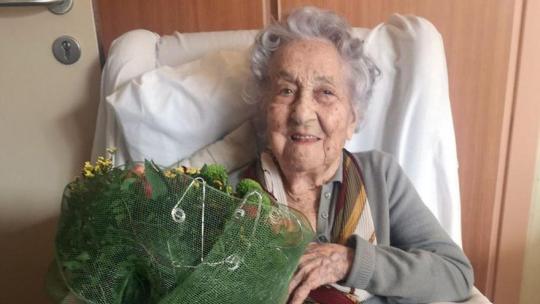
#ask#anonymous#maria branyas morera#world record#supercentenarian#gerontology#gerontologia#world records
157 notes
·
View notes
Text
Look at what I am reading in the Bible. “Stand up in the presence of the elderly, and show respect for the aged. Fear your God. I am the Lord.”
Leviticus 19:32
I think I have a good job. I am a certified nurse assistant. I take care of the elderly in a nursing home. It is not easy to take care of the elderly sometimes because some patients have dementia, weakness, and psychological illnesses. They get confused and anxious. In my opinion, you have to have a kind and patient heart with them. You also need to have a humbled heart. As a nurse assistant, we have to clean the patient. Clean them like change their diaper and clean their room because infection control is a thing. Shower them. Feed them. Give them companionship. I also have noticed that taking care of the elderly has helped me respect my parents more. Also think of God more. I like to pray with the patients because some patients love it when I pray for them. So, I like this Bible verse how God says we need to respect the elderly. God knows everything we do. Nothing is hidden from Him.
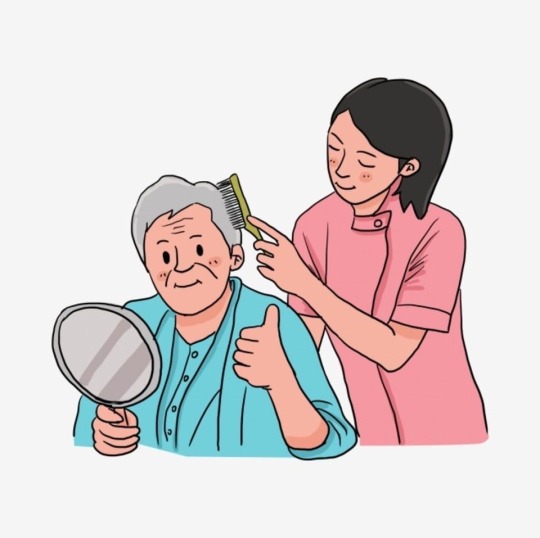
#nursing#cna#certified nurse assistant#licensed practical nurse#registered nurse#geriatrics#gerontology#elderly#follow#catholic#love#christian#grace#friendship#dating#marriage#empath#courtship#service oriented#nursing home#kindness#patience#Godly
3 notes
·
View notes
Text
The 109 Year Old Athlete
youtube
Here is the year 2020
8 notes
·
View notes
Text
Guia para prevenção de quedas em idosos
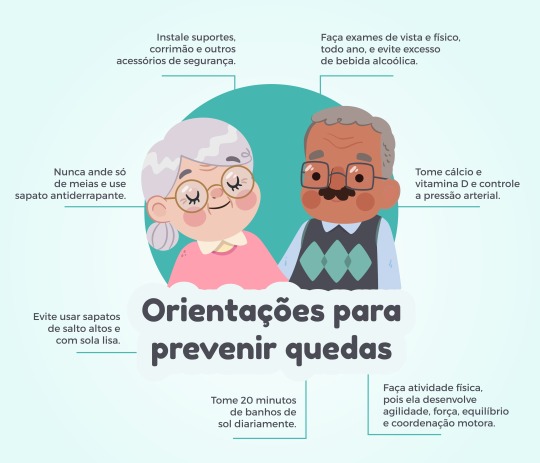
As quedas em idosos são um problema de saúde comum e sério, podendo levar a lesões graves e até mesmo à morte. Felizmente, há muitas medidas que podem ser tomadas para evitar quedas. Aqui estão algumas dicas para ajudar os idosos a evitar quedas:
✅ Exercício físico regular: Um programa de exercícios regulares pode ajudar a melhorar o equilíbrio e a força dos idosos, reduzindo o risco de quedas. ⚽🏊🏻♀️🏌🏻♀️
✅ Uso de calçados adequados: Calçados com solas antiderrapantes e fechados são recomendados para idosos, pois ajudam a melhorar a aderência e a estabilidade durante a caminhada. 👣
✅ Iluminação adequada: Certifique-se de que a iluminação em todos os cômodos da casa seja adequada, especialmente em corredores, escadas e banheiros.💡
✅ Eliminação de obstáculos: Retire tapetes soltos, fios elétricos, objetos espalhados pelo chão, móveis em locais inadequados, entre outros objetos que possam dificultar a locomoção.
✅ Uso de dispositivos de apoio: Se o idoso tem dificuldade para caminhar ou manter o equilíbrio, é recomendável o uso de dispositivos de apoio, como bengalas ou andadores. 🧑🏻🦽👩🦯👨🦯
✅ Revisão da medicação: Alguns medicamentos podem causar tonturas ou sonolência, aumentando o risco de quedas. Certifique-se de que o idoso está tomando apenas os medicamentos necessários e na dosagem correta. 💊💉
✅ Avaliação da visão: A visão é importante para manter o equilíbrio e a orientação espacial. Verifique se o idoso está usando lentes corretivas e faça avaliações regulares com um oftalmologista.
✅ Manutenção da casa: Certifique-se de que a casa esteja em boas condições, sem rachaduras, vazamentos ou problemas na fiação elétrica. Instale barras de apoio em banheiros e corredores, e verifique se as escadas têm corrimão. 🏠
✅ Acompanhamento médico: Idosos com condições de saúde crônicas, como diabetes ou doenças cardiovasculares, devem receber acompanhamento médico regular para evitar complicações que possam levar a quedas. 🏥👩⚕
✅ Treinamento de cuidadores: Se o idoso é cuidado por outra pessoa, é importante que essa pessoa receba treinamento sobre como ajudar o idoso a evitar quedas e como agir em caso de queda.
Estas são algumas medidas importantes para evitar quedas em idosos. No entanto, cada caso é único, e é importante consultar um médico ou profissional de saúde para orientações específicas. 💡
➡️Quer saber mais?
Acesse a Cartilha do Idoso: https://bvsms.saude.gov.br/bvs/publicacoes/guia_viver_mais_melhor_melhor_2006.pdf
Ministerio da Saúde
#idosos#fisioterapia#dicas#guia#guiadoidoso#saudedoidoso#saúde do idoso#health & fitness#fisiologia#gerontology
2 notes
·
View notes
Quote
The job of any doctor, Bludau later told me, is to support quality of life, by which he meant two things: as much freedom from the ravages of disease as possible and the retention of enough function for active engagement in the world. Most doctors treat disease and figure that the rest will take care of itself. And if it doesn't–if a patient is becoming infirm and heading toward a nursing home–well, that isn't really a /medical/ problem, is it?
Being Mortal: Illness, Medicine, and What Matters in the End, Atul Gawande
#page 41#being mortal#illness medicine and what matters in the end#atul gawande#mortality#death#medicine#gerontology#geriatric#aging#dying#illness#juergen bludau#quote#quotes#literature#book#booklr#reading
9 notes
·
View notes
Text
Parenting 360 - Take 4: Critical Importance of Medication Review
This may be the most important thing I ever write for the health of your parent or other loved one: Check medications for side effects and contraindications on a regular basis. Their health may depend on your vigilance.
Medication organizer
My last parenting post centered on our adventures in supporting an adult son with Autism Spectrum Disorder (ASD) which have brought us from Washington DC to Israel where he has been able to live away from home in a supportive community for the first time. You can read more about our experiences here, here and here.
Today I am returning to the other side of the coin, the…
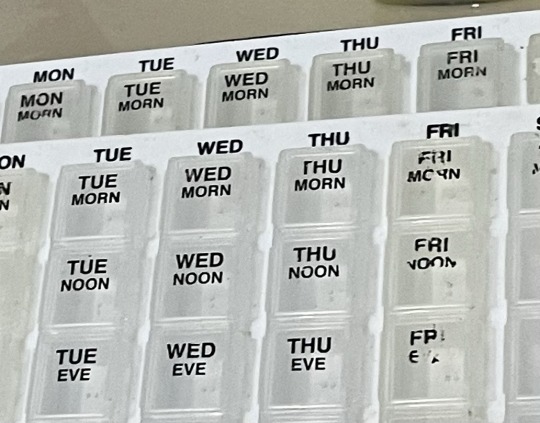
View On WordPress
#2ndMiddleAge#Adverse Events#Assisted Living#Doctor#Gerontology#HealthyAging#Medical Care#medications#Nursing#parents#Side Effects
2 notes
·
View notes
Text
Grieving and Coping
Glass of red wine
Today I am talking to those of you who are the remaining spouse, having placed your loved one into a care facility.
Perhaps you are the type of person who needs to stay busy rather than just sit at home when coping with this condition known as Alzheimer’s. I would suspect that this is the case: God is making a way of escape for you by leading you to influential people in order…

View On WordPress
#aging#eldercarejobs#elderly#geriatriccare#gerontology#homebasedcare#homecare#professionalrelative#skilledcompanion#alcohol#alzheimer#eldercare#grief#loss#memory loss#nursing homes#sadness
2 notes
·
View notes
Text
NPR: Bias against older people in health care settings is common and harmful : Shots - Health News
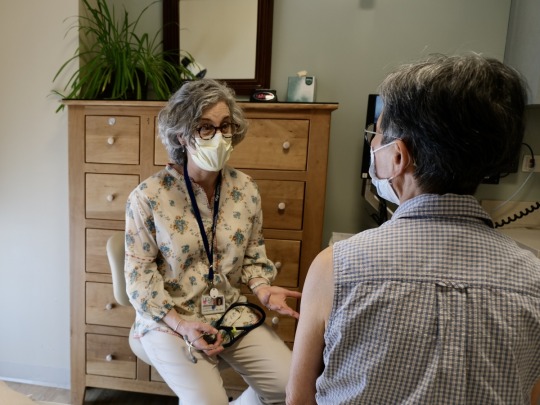
Dr. Louise Aronson, a geriatrician and author, speaks with a patient at UCSF's Osher Center for Integrative Health in San Francisco.
/Julia Burns
A recent study found that older people spend an average of 21 days a year on medical appointments. Kathleen Hayes can believe it.
Hayes lives in Chicago and has spent a lot of time lately taking her parents, who are both in their 80s, to doctor's appointments. Her dad has Parkinson's, and her mom has had a difficult recovery from a bad bout of Covid-19. As she's sat in, Hayes has noticed some health care workers talk to her parents at top volume, to the point, she says, "that my father said to one, 'I'm not deaf, you don't have to yell.'"
In addition, while some doctors and nurses address her parents directly, others keep looking at Hayes herself.
"Their gaze is on me so long that it starts to feel like we're talking around my parents," says Hayes, who lives a few hours north of her parents. "I've had to emphasize, 'I don't want to speak for my mother. Please ask my mother that question.'"
Researchers and geriatricians say that instances like these constitute ageism – discrimination based on a person's age – and it is surprisingly common in health care settings. It can lead to both overtreatment and undertreatment of older adults, says Dr. Louise Aronson, a geriatrician and professor of geriatrics at the University of California, San Francisco.
"We all see older people differently. Ageism is a cross-cultural reality," Aronson says.
Ageism creeps in, even when the intent is benign, says Aronson, who wrote the book, Elderhood. "We all start young, and you think of yourself as young, but older people from the very beginning are other."
That tendency to see older adults as "other" doesn't just result in loud greetings, or being called "honey" while having your blood pressure taken, both of which can dent a person's morale.
Aronson says assumptions that older people are one big, frail, homogenous group can cause more serious issues. Such as when a patient doesn't receive the care they need because the doctor is seeing a number, rather than an individual.
"You look at a person's age and say, 'Ah, you're too old for this,' instead of looking at their health, and function, and priorities, which is what a geriatrician does," says Aronson.
She says the problem is most doctors receive little education on older bodies and minds.
"At my medical school we only get two weeks to teach about older people in a four-year curriculum," she says.
Aronson adds that overtreatment comes in when well-meaning physicians pile on medications and procedures. Older patients can suffer unnecessarily.
"There are things...that happen again and again and again because we don't teach [physicians] how to care about older people as fully human, and when they get old enough to appreciate it, they're already retired," says Aronson.
Kris Geerken is co-director of Changing the Narrative, an organization that wants to end ageism. She says research shows that negative beliefs about aging - our own or other people's - are detrimental to our health.
"It actually can accelerate cognitive decline, increase anxiety, it increases depression. It can shorten our lifespans by up to seven-and-a-half years," she says, adding that a 2020 study showed that discrimination against older people, negative age stereotypes, and negative perceptions around one's own age, cost the health care system $63 billion a year.
Still, beliefs can change.
"When we have positive beliefs about age and aging, those things are all flipped," Geerken says, and we tend to age better.
Geerken conducts anti-ageism trainings, often over Zoom, including trainings for health care workers. She also advises older adults on how to push back if they feel their medical concerns are being dismissed with comments like, "It's to be expected at your age."
Age-Friendly Health Systems are another initiative designed to curb ageism in the health care industry.
Leslie Pelton is vice president at the Institute for Healthcare Improvement, which launched the concept of Age-Friendly Health Systems in 2018, along with the John A. Hartford Foundation.
She describes the effort as one in which every aspect of care, including mobility, mental health and medication, is centered on the needs and desires of the older adult.
Pelton says 3,700 sites across the US - including clinics, hospitals, and nursing homes - are now designated age-friendly.
She describes the system as "a counterbalance to ageism, because it requires that a clinician begins with asking and acting on what matters to the older adult, so right away the older adult is being seen and being heard."
That sounds great to Liz Schreier. Schreier is 87 and lives in Buffalo. She walks and does yoga regularly. She also has a heart condition and emphysema and spends plenty of time at the doctor. She lives alone and says she has to be her own advocate.
"What I find is a disinterest. I'm not very interesting to them," she says. "And I'm one of many - you know, one of those old people again."
She goes from specialist to specialist, hoping for help with little things that keep cropping up.
"I had a horrible experience with a gastroenterologist who said I was old, and he didn't think he wanted to do a scope on me, which was a little insulting," she says.
She later found one of his colleagues who would.
Schreier says navigating the health care system in your 80s is tough. What she and her peers are looking for from health care workers, she says, is kindness, and advice on how to stay active and functional no matter how old they are.
#ageism#medical treatment#health care#Bias against older people in health care settings is common and harmful#americanisms#hateful#health care system broken#american health care is broken#discrimination based on a person's age#gerontology
1 note
·
View note
Text
Resources for Adult Children of Aging Baby Boomers
Betsy’s special guest today is Bina Colman, the Founder of Compassionate Callers and Head of Patron Engagement at Parent Projects™. Armed with a degree in Gerontology, Bina became a caregiver for her father who faced dementia in his mid-fifties.
In their conversation, Bina sheds light on the motivation behind creating Compassionate Callers, a distinctive calling service designed to aid…
View On WordPress
#Adult Children#Alzheimers#Baby Boomers#Betsy Wurzel#Bina Colman#Caregiver Tips#Caregivers#Compassionate Concierge#Dementia#Gerontology
0 notes
Text
Pig blood boys make rats more youthful https://link.springer.com/article/10.1007/s11357-023-00980-6
0 notes
Text
What Should Seniors Be Looking for In a Sectional, Sofa, Loveseat or Chair?
This is why we don’t generally recommend swivel chairs, gliders, or sofas/loveseats with glider mechanisms, or even many push-back recliners to our senior shoppers. These types of seating are less stable because they can shift or move while you’re trying
Furniture serves a very clear purpose in your home. Whether visually, aesthetically, or through the utility it provides, your furniture exists solely to enrich your life. So why would you furnish your home with something that not only doesn’t benefit you, but actually causes pain or inconvenience? Your furniture should be a benefit to your life, not a liability. Yet, many shoppers unfortunately…

View On WordPress
#custom made furniture#custom made sofa#gerontology#interior design#lifestyle#retirement#seniors#sentosa#Singapore expats#sofa
0 notes
Text
Mastering Caregiving: Essential Courses for Compassionate Support and Empowermen
Caring for a loved one or working in the caregiving profession demands specialized knowledge and skills. "Mastering Caregiving" offers a comprehensive range of essential courses designed to empower caregivers with the expertise needed to provide compassionate and effective support. These courses cover a wide spectrum, from understanding medical conditions and medication management to fostering emotional well-being and enhancing communication. By completing this program, caregivers gain the confidence and proficiency necessary to ensure the best possible care for those they serve. Elevate your caregiving journey and make a significant impact on the lives of those in your care through our empowering educational courses.
#GeriatricNurseCertification#SeniorCare#ElderlyHealth#NursingEducation#AgingPopulation#HealthcareTraining#NursingExpertise#Gerontology#PatientCare#ElderlyCare#GeriatricNursing#NursingCertification#GeriatricHealth#AgingWell#HealthcareCareer#NursingSkills#QualityCare#ElderlyPatients#NurseTraining#SeniorHealthcare
1 note
·
View note
Text
Naked Mole Rat's Longevity Gene Gives Mice a Longer Life
The naked mole rat is arguably the strangest looking mammal on the planet. However, beneath its wrinkly exterior may lie secrets that could extend human lifespan. In a new study, published in the journal Nature, researchers reported that they successfully transferred a naked mole rat gene into mice, leading to improved health and longevity.
Researchers transferred a longevity gene from naked mole…

View On WordPress
#Animal research#Anti-Aging#Biotechnology#Gene transfer#Genetics#Gerontology#Healthspan#Hyaluronic acid#Life extension#Lifespan extension#Mice#Naked mole rat
0 notes
Text
How a clock measures time and how you perceive it are quite different. As we grow older, it can often feel like time goes by faster and faster.
Für Kinder dauert ein Jahr eine gefühlte Ewigkeit, im Alter geht die Zeit im Nu vorbei.
3 notes
·
View notes
Text
Brain health and better memory for seniors stay off of NyQuil, p.m. and Benadryl among others. This woman is a MD PhD geriatrician of which only about 3% of doctors go into that field.
Basically, a lot of drugs break down and block acetylcholine. That’s what the brain needs for signaling this is a great non-commercial video.
youtube
View On WordPress
0 notes
Quote
A study led by the sociologist Nicholas Christakis asked the doctors of almost five hundred terminally ill patients to estimate how long they thought their patient would survive and then followed the patients. Sixty-three percent of doctors overestimated their patient's survival time. Just 17 percent underestimated it. The average estimate was 530 percent too high. And the better the doctors knew their patients, the more likely they were to err.
Being Mortal: Illness, Medicine, and What Matters in the End, Atul Gawande
#page 167#being mortal#illness medicine and what matters in the end#atul gawande#mortality#death#medicine#gerontology#geriatric#aging#dying#illness#terminal#nicholas christakis#sociology#quote#quotes#literature#book#booklr#reading
2 notes
·
View notes